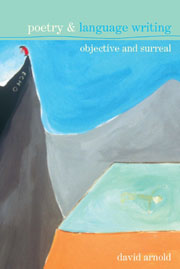Book contents
- Frontmatter
- Contents
- Acknowledgements
- List of permissions
- 1 The Scholarly Life of Language Writing
- 2 Surrealism: An Excommunicated Vessel?
- 3 Under the Sign of Negation: William Carlos Williams and Surrealism
- 4 The Surreal-O-bjectivist Nexus
- 5 Michael Palmer's Poetics of Witness
- 6 Scorch and Scan: The Writing of Susan Howe
- 7 ‘Just Rehashed Surrealism’? The Writing of Barrett Watten
- Notes
- Bibliography
- Index
3 - Under the Sign of Negation: William Carlos Williams and Surrealism
- Frontmatter
- Contents
- Acknowledgements
- List of permissions
- 1 The Scholarly Life of Language Writing
- 2 Surrealism: An Excommunicated Vessel?
- 3 Under the Sign of Negation: William Carlos Williams and Surrealism
- 4 The Surreal-O-bjectivist Nexus
- 5 Michael Palmer's Poetics of Witness
- 6 Scorch and Scan: The Writing of Susan Howe
- 7 ‘Just Rehashed Surrealism’? The Writing of Barrett Watten
- Notes
- Bibliography
- Index
Summary
Which Williams?
When Ron Silliman cites Kora in Hell as a formal precursor to the ‘new sentence’ (see Chapter 2), he intervenes in the politics of canon formation, for the Williams of the improvisations is not the same writer as the Williams known and celebrated for his exemplary American voice. As Hank Lazer points out, to understand the ‘particular traditions’ of Language writing we need to acknowledge the ways in which its participants have engaged in ‘a deliberate act of rewriting literary history’. Despite the playful title of the essay in which he makes this claim – ‘Language Writing; or Literary History and the Strange Case of the Two Dr. Williamses’ – Lazer makes clear that this act has entailed a battle over the representation of Williams. This battle has not taken place on a level playing field; by the time that Ron Silliman and Charles Bernstein joined the fray in the 1980s, there already existed a hegemonic version of Williams as ‘the poet of common objects, immediate description, and common life’. By the 1980s, this characterization had come to sponsor both the appearance of his work in anthologies and a preferred aesthetic in poetry workshops across the nation.
Against this academically sanctioned version of Williams, both Silliman and Bernstein stress the oppositional bite and drive of his work. For Silliman, the ‘critical element of oppositionality’ shared by Williams with Gertrude Stein, Louis Zukofsky, Charles Olson and Robert Creeley was ‘the identification of method with content’.
- Type
- Chapter
- Information
- Poetry and Language WritingObjective and Surreal, pp. 31 - 60Publisher: Liverpool University PressPrint publication year: 2007



